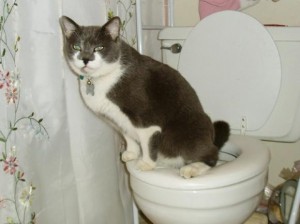Don't Flush Cat Poop Down Your Toilet - Preserve Your House's Pipe System
Don't Flush Cat Poop Down Your Toilet - Preserve Your House's Pipe System
Blog Article
Right here in the next paragraph you will discover lots of quality insight pertaining to Don’t flush cat feces down the toilet.

Introduction
As feline proprietors, it's essential to be mindful of exactly how we get rid of our feline close friends' waste. While it might seem practical to purge cat poop down the bathroom, this method can have destructive effects for both the environment and human health.
Environmental Impact
Purging feline poop presents harmful virus and parasites right into the water, positioning a substantial threat to aquatic communities. These pollutants can adversely impact aquatic life and compromise water quality.
Health Risks
In addition to environmental issues, flushing feline waste can likewise position health and wellness dangers to people. Cat feces may contain Toxoplasma gondii, a parasite that can create toxoplasmosis-- a possibly serious health problem, particularly for pregnant women and people with damaged immune systems.
Alternatives to Flushing
The good news is, there are much safer and extra liable methods to deal with pet cat poop. Take into consideration the following options:
1. Scoop and Dispose in Trash
The most common technique of throwing away feline poop is to scoop it right into an eco-friendly bag and toss it in the garbage. Be sure to utilize a committed clutter scoop and deal with the waste promptly.
2. Use Biodegradable Litter
Choose eco-friendly cat trash made from products such as corn or wheat. These clutters are eco-friendly and can be securely gotten rid of in the trash.
3. Hide in the Yard
If you have a lawn, take into consideration hiding feline waste in a designated area away from veggie gardens and water resources. Make sure to dig deep adequate to stop contamination of groundwater.
4. Mount a Pet Waste Disposal System
Invest in a family pet garbage disposal system especially developed for feline waste. These systems make use of enzymes to break down the waste, decreasing smell and environmental influence.
Final thought
Accountable family pet ownership expands beyond supplying food and sanctuary-- it also includes proper waste administration. By avoiding purging cat poop down the toilet and opting for alternate disposal approaches, we can decrease our ecological footprint and safeguard human wellness.
Why Can’t I Flush Cat Poop?
It Spreads a Parasite
Cats are frequently infected with a parasite called toxoplasma gondii. The parasite causes an infection called toxoplasmosis. It is usually harmless to cats. The parasite only uses cat poop as a host for its eggs. Otherwise, the cat’s immune system usually keeps the infection at low enough levels to maintain its own health. But it does not stop the develop of eggs. These eggs are tiny and surprisingly tough. They may survive for a year before they begin to grow. But that’s the problem.
Our wastewater system is not designed to deal with toxoplasmosis eggs. Instead, most eggs will flush from your toilet into sewers and wastewater management plants. After the sewage is treated for many other harmful things in it, it is typically released into local rivers, lakes, or oceans. Here, the toxoplasmosis eggs can find new hosts, including starfish, crabs, otters, and many other wildlife. For many, this is a significant risk to their health. Toxoplasmosis can also end up infecting water sources that are important for agriculture, which means our deer, pigs, and sheep can get infected too.
Is There Risk to Humans?
There can be a risk to human life from flushing cat poop down the toilet. If you do so, the parasites from your cat’s poop can end up in shellfish, game animals, or livestock. If this meat is then served raw or undercooked, the people who eat it can get sick.
In fact, according to the CDC, 40 million people in the United States are infected with toxoplasma gondii. They get it from exposure to infected seafood, or from some kind of cat poop contamination, like drinking from a stream that is contaminated or touching anything that has come into contact with cat poop. That includes just cleaning a cat litter box.
Most people who get infected with these parasites will not develop any symptoms. However, for pregnant women or for those with compromised immune systems, the parasite can cause severe health problems.
How to Handle Cat Poop
The best way to handle cat poop is actually to clean the box more often. The eggs that the parasite sheds will not become active until one to five days after the cat poops. That means that if you clean daily, you’re much less likely to come into direct contact with infectious eggs.
That said, always dispose of cat poop in the garbage and not down the toilet. Wash your hands before and after you clean the litter box, and bring the bag of poop right outside to your garbage bins.
https://trenchlesssolutionsusa.com/why-cant-i-flush-cat-poop/

Do you appreciate reading up on How to Dispose of Cat Poop and Litter Without Plastic Bags? Try leaving feedback down below. We would be interested to know your thoughts about this article. In hopes that you visit us again soon. You should take a moment to promote this blog post if you appreciated it. I enjoy reading our article about Can You Flush Cat Poop Down The Toilet?.
Call Us Now Report this page